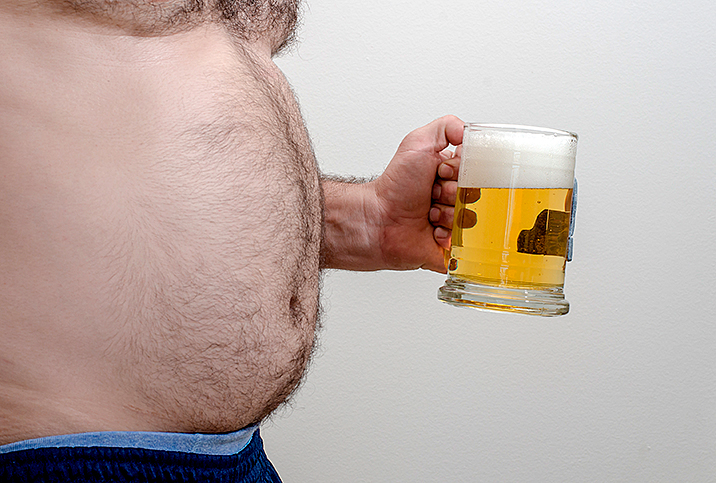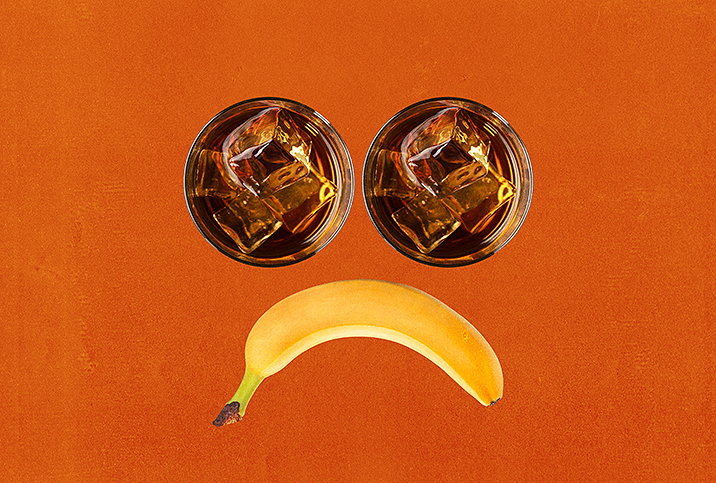5 Annoying Side Effects of Frequent or Heavy Drinking

Drinking occasionally in moderation is unlikely to cause major health problems, but heavy drinking can have a lasting impact on your overall health and cause a whole slew of mental and physical side effects.
The Mayo Clinic defines moderate alcohol use for healthy adults as up to one drink a day for women and up to two drinks a day for men. In this context, a single drink is equivalent to 12 ounces of beer, 5 ounces of wine or 1.5 ounces of liquor. This level of drinking isn't risk-free, but it's safer than binge or heavy drinking.
Here's what a night of binge drinking or drinking heavily over time can be responsible for:
1. Weight gain
Aside from the other health concerns excessive drinking causes, alcohol can make you put on extra pounds. There are a few main reasons for this. The main issue is when you drink, your body puts most of its energy toward breaking down the alcohol, which, in turn, prevents your body from burning fat as it normally would. This problem can be compounded if your drink of choice is full of sugar or if you tend to indulge in fast food or other unhealthy food choices once you get a buzz going. Additionally, excessive drinking can lead to high blood pressure, heart disease, insulin resistance and other health issues.
2. Waking up 'puffy'
Have you ever woken up after a night of heavy drinking and been shocked at how puffy and swollen your face looks? There's a reason. Alcohol can leave you dehydrated, so your body and skin respond by retaining as much water as possible. This is why you may wake up with a puffy face or a bloated belly. If you wake up with a particularly puffy face or case of bloat, counteract the effect by drinking plenty of water and getting hydrated.
3. Pain in your toes—yes, toes
As it turns out, heavy drinking—even on one night—can lead to gout attacks. Gout is a type of arthritis that affects the joints, most commonly in the feet or toes, though it can also occur elsewhere. Gout is caused by a buildup of uric acid in the blood. Uric acid crystals can deposit in or surrounding the joints over time as well as deposit in other organ tissues (leading to kidney stones). Some people have gout simply because they eat too much red meat, certain seafood or fructose-containing products. But according to experts, heavy drinking paired with dehydration can trigger a gout flare-up too.
While people who struggle with gout are more likely to suffer from these flare-ups, it's important to know anyone can experience one as a result of heavy drinking. Risk factors that make certain people more likely to get gout include being obese/overweight, having chronic endocrine/cardiovascular or kidney disease, or be taking certain medications, such as aspirin. Men are more likely to get gout than women.
The best thing to do if you wake up with intense pain and throbbing in the joints of your toes is to drink plenty of water and avoid triggers such as red meat and sugary drinks until you start to feel better. It is also recommended you moderate alcohol consumption and seek a doctor's advice because you should not suddenly stop consuming alcohol as there may be risks due to withdrawal.
4. Blank spots in your memory
Few feelings can rival the embarrassment you feel upon finding out you texted your ex or did something else dumb during a night out drinking—especially when it's all news to you.
Drinking can affect your brain's ability to create and store memories, which is why having too many can lead to blackouts—events you have no recollection of. Alcohol also affects your ability to regulate emotions and can inhibit your judgment, which can lead you to make some out-of-character choices you may or may not remember the next day. The possible legal ramifications could change your life forever.
According to medical experts, chronic alcohol abuse can lead to permanent brain damage and memory issues.
5. Killing the mood
One of alcohol's many effects is it slows down the communication between your brain and your body—this is why slurring your words is often one of the first signs you're drunk. This effect, coupled with the fact that alcohol can inhibit sex hormone production, can create a recipe for a disappointing night in bed. Both men and women are more likely to experience sexual dysfunction after heavy drinking.
So while it may be tempting to throw another one back to loosen yourself up or to just add some excitement to a night out, be sure to pace yourself and know when to stop if you want to avoid an unsatisfying night in the sack.
Drinking in moderation occasionally isn't a cause for concern, some experts even saying it might provide a few health benefits. But it's important to understand that alcohol—as with most other things—can pose a significant health threat when it's abused. Anyone with family members who live with substance dependence issues should particularly be alert as a component of addiction can be genetic.


















